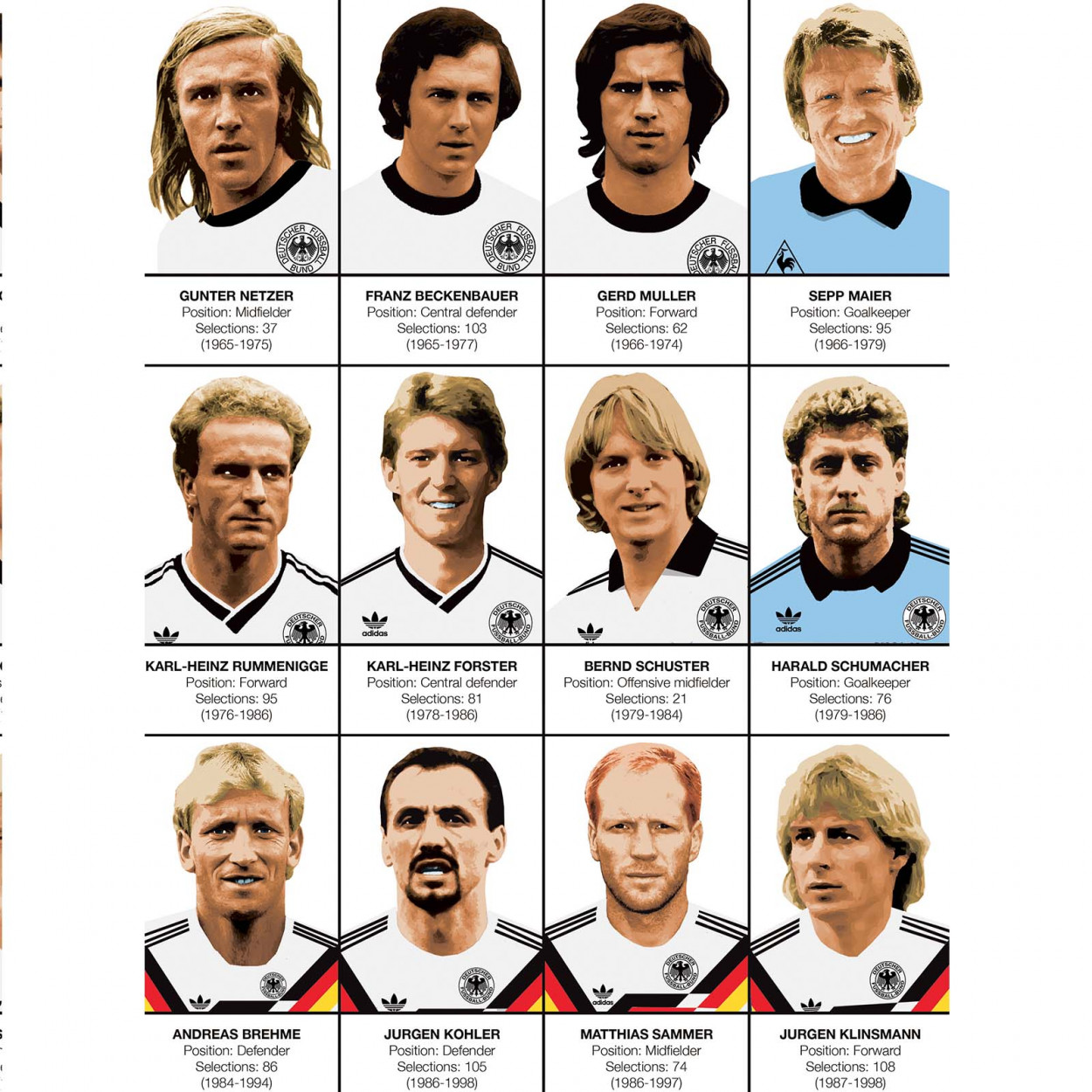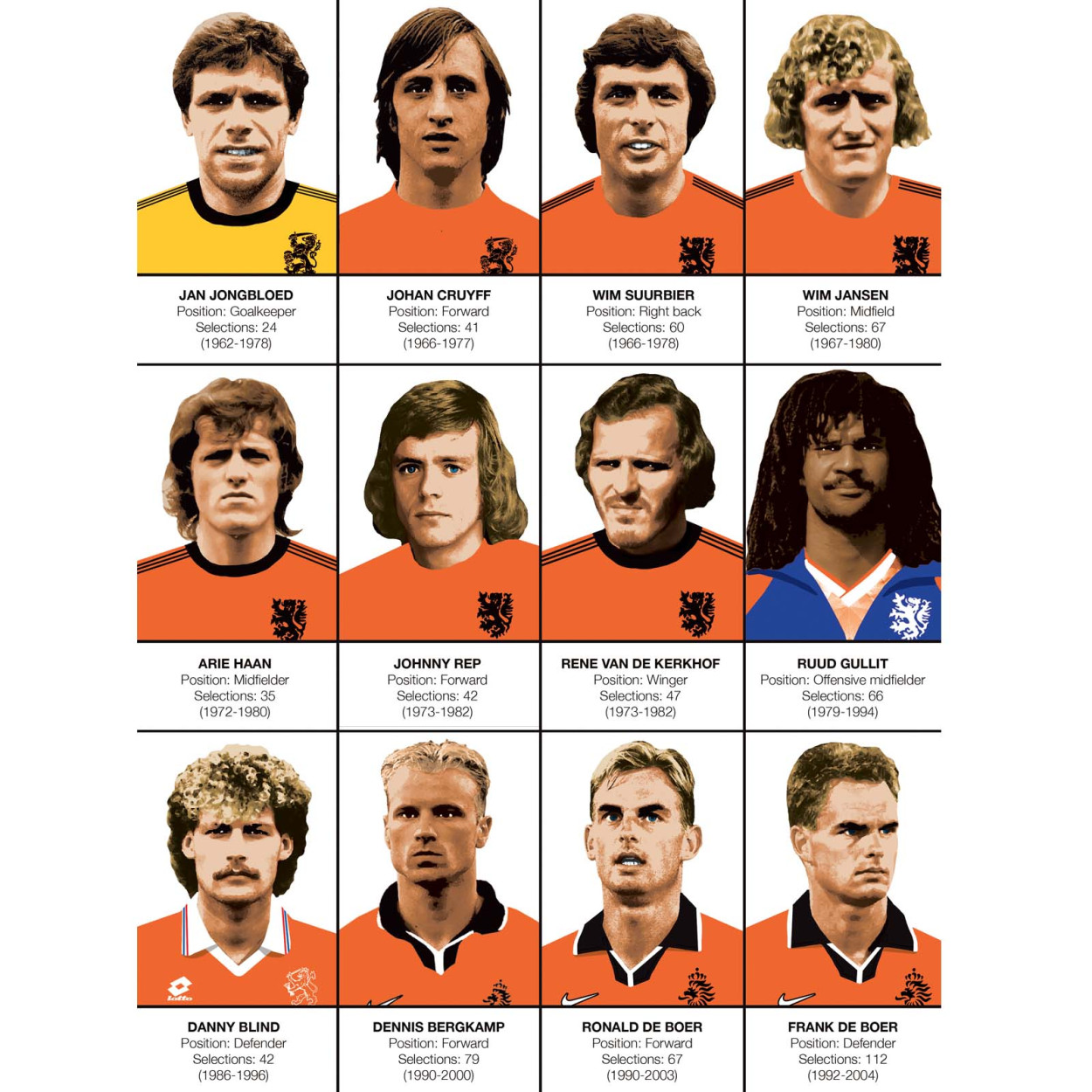“Football Legends from Germany
Related Articles Football Legends from Germany
Football Legends from Germany

Germany has a rich and storied history in the world of football, consistently producing world-class players who have left an indelible mark on the sport. These legends have not only achieved remarkable success at the club level but have also played pivotal roles in Germany’s triumphs on the international stage. This article delves into the careers and accomplishments of some of the most iconic football legends from Germany, celebrating their contributions to the beautiful game.
1. Franz Beckenbauer: "Der Kaiser"
Franz Beckenbauer, often referred to as "Der Kaiser" (The Emperor), is arguably the most influential figure in German football history. Born on September 11, 1945, in Munich, Beckenbauer revolutionized the role of the sweeper, transforming it into an attacking and creative force.
- Club Career: Beckenbauer spent the majority of his club career with Bayern Munich, where he won four Bundesliga titles (1969, 1972, 1973, 1974), four German Cups (1966, 1967, 1969, 1971), and three consecutive European Cups (1974, 1975, 1976). He later played for the New York Cosmos in the North American Soccer League (NASL) before returning to Germany for a brief stint with Hamburger SV.
- International Career: Beckenbauer captained West Germany to victory in the 1972 European Championship and the 1974 FIFA World Cup. He earned 103 caps for his country and was renowned for his leadership, vision, and elegance on the ball.
- Managerial Career: After retiring as a player, Beckenbauer transitioned into coaching and managed West Germany to victory in the 1990 FIFA World Cup. He also coached Bayern Munich, winning the Bundesliga title in 1994 and the UEFA Cup in 1996.
- Legacy: Beckenbauer’s impact on football extends beyond his playing and managerial achievements. He is credited with redefining the sweeper position and inspiring generations of defenders. His leadership, tactical acumen, and charisma made him a true icon of the sport.
2. Gerd Müller: "Der Bomber"
Gerd Müller, nicknamed "Der Bomber" (The Bomber), was one of the most prolific goalscorers in football history. Born on November 3, 1945, in Nördlingen, Müller possessed an uncanny ability to find the back of the net, scoring goals with remarkable consistency and efficiency.
- Club Career: Müller spent the majority of his club career with Bayern Munich, where he scored a staggering 365 goals in 427 Bundesliga appearances. He also won four Bundesliga titles (1969, 1972, 1973, 1974), four German Cups (1966, 1967, 1969, 1971), and three consecutive European Cups (1974, 1975, 1976).
- International Career: Müller scored 68 goals in 62 appearances for West Germany, including the winning goal in the 1974 FIFA World Cup final against the Netherlands. He also won the 1972 European Championship with his country.
- Goalscoring Prowess: Müller’s goalscoring record is legendary. He was a master of positioning, anticipation, and finishing, consistently finding space in the penalty area and converting chances with ruthless efficiency. His ability to score crucial goals in important matches earned him the reputation as one of the greatest strikers of all time.
- Legacy: Müller’s goalscoring exploits have cemented his place as one of the greatest strikers in football history. His records stood for many years, and his name remains synonymous with goalscoring excellence.

3. Lothar Matthäus: The Evergreen Captain
Lothar Matthäus, born on March 21, 1961, in Erlangen, is one of the most capped players in football history, having represented Germany 150 times. A versatile midfielder known for his athleticism, tactical intelligence, and leadership, Matthäus enjoyed a long and successful career at both the club and international levels.
- Club Career: Matthäus played for several top clubs, including Bayern Munich, Inter Milan, and Borussia Mönchengladbach. He won seven Bundesliga titles with Bayern Munich (1985, 1986, 1987, 1989, 1994, 1997, 1999) and the Serie A title with Inter Milan in 1989.
- International Career: Matthäus captained West Germany to victory in the 1990 FIFA World Cup, where he was also named the tournament’s best player. He played in five World Cups (1982, 1986, 1990, 1994, 1998) and four European Championships (1980, 1984, 1988, 2000), showcasing his longevity and commitment to his country.
- Versatility and Leadership: Matthäus was a complete midfielder, capable of playing in various positions and excelling in both defensive and offensive roles. His leadership qualities were evident throughout his career, and he served as a captain for both club and country.
- Legacy: Matthäus is revered as one of the greatest midfielders of all time. His longevity, versatility, and leadership have made him a role model for aspiring footballers.
4. Jürgen Klinsmann: The Charismatic Striker
Jürgen Klinsmann, born on July 30, 1964, in Göppingen, was a dynamic and charismatic striker who enjoyed a successful career with both club and country. Known for his athleticism, goalscoring ability, and infectious enthusiasm, Klinsmann was a popular figure among fans and teammates alike.
- Club Career: Klinsmann played for several top clubs, including VfB Stuttgart, Inter Milan, AS Monaco, Tottenham Hotspur, and Bayern Munich. He won the UEFA Cup with Inter Milan in 1991 and the Bundesliga title with Bayern Munich in 1997.
- International Career: Klinsmann scored 47 goals in 108 appearances for Germany, including three goals in the 1990 FIFA World Cup and five goals in the 1994 FIFA World Cup. He was part of the German team that won the 1990 FIFA World Cup and the 1996 European Championship.
- Goalscoring and Leadership: Klinsmann was a prolific goalscorer with a knack for scoring important goals in crucial matches. He was also a natural leader, inspiring his teammates with his passion and determination.
- Managerial Career: After retiring as a player, Klinsmann transitioned into coaching and managed the German national team from 2004 to 2006, leading them to a third-place finish in the 2006 FIFA World Cup. He also coached Bayern Munich and the United States national team.
- Legacy: Klinsmann is remembered as one of Germany’s most beloved footballers. His goalscoring exploits, leadership qualities, and charismatic personality have made him a true icon of the sport.
5. Oliver Kahn: The Titan
Oliver Kahn, born on June 15, 1969, in Karlsruhe, is widely regarded as one of the greatest goalkeepers in football history. Known for his athleticism, reflexes, and intimidating presence, Kahn was a dominant force in the penalty area.
- Club Career: Kahn spent the majority of his club career with Bayern Munich, where he won eight Bundesliga titles (1994, 1997, 1999, 2000, 2001, 2003, 2005, 2006), six German Cups (1998, 2000, 2003, 2005, 2006, 2008), and the UEFA Champions League in 2001.
- International Career: Kahn earned 86 caps for Germany and was the team’s first-choice goalkeeper during the 2002 FIFA World Cup, where he won the Golden Ball as the tournament’s best player despite Germany losing to Brazil in the final.
- Goalkeeping Excellence: Kahn was a complete goalkeeper, excelling in all aspects of the position. His shot-stopping ability, command of the penalty area, and mental strength made him a formidable opponent for any striker.
- Leadership and Intensity: Kahn was known for his leadership qualities and his intense passion for the game. He demanded the best from himself and his teammates, and his competitive spirit was infectious.
- Legacy: Kahn is revered as one of the greatest goalkeepers of all time. His achievements, leadership, and intensity have made him a role model for aspiring goalkeepers around the world.
6. Bastian Schweinsteiger: The Midfield Maestro
Bastian Schweinsteiger, born on August 1, 1984, in Kolbermoor, is a highly decorated midfielder who enjoyed a successful career with both club and country. Known for his versatility, technical ability, and tactical intelligence, Schweinsteiger was a key player for both Bayern Munich and the German national team.
- Club Career: Schweinsteiger spent the majority of his club career with Bayern Munich, where he won eight Bundesliga titles (2003, 2005, 2006, 2008, 2010, 2013, 2014, 2015), seven German Cups (2003, 2005, 2006, 2008, 2010, 2013, 2016), and the UEFA Champions League in 2013. He later played for Manchester United and Chicago Fire.
- International Career: Schweinsteiger earned 121 caps for Germany and was a key member of the team that won the 2014 FIFA World Cup. He also played in three other World Cups (2006, 2010, 2018) and four European Championships (2004, 2008, 2012, 2016).
- Versatility and Technical Ability: Schweinsteiger was a versatile midfielder, capable of playing in various positions and excelling in both defensive and offensive roles. His technical ability, passing range, and vision made him a valuable asset to any team.
- Leadership and Determination: Schweinsteiger was a natural leader, inspiring his teammates with his determination and commitment. He was known for his work ethic and his willingness to put the team first.
- Legacy: Schweinsteiger is regarded as one of the greatest German midfielders of his generation. His achievements, versatility, and leadership have made him a role model for aspiring footballers.
Conclusion
These are just a few of the many football legends from Germany who have graced the sport with their talent, skill, and dedication. Their achievements at both the club and international levels have inspired generations of footballers and fans alike. These legends have not only brought glory to Germany but have also left an enduring legacy on the beautiful game. Their names will forever be etched in the annals of football history, serving as a reminder of the greatness that can be achieved through hard work, determination, and a passion for the sport.

